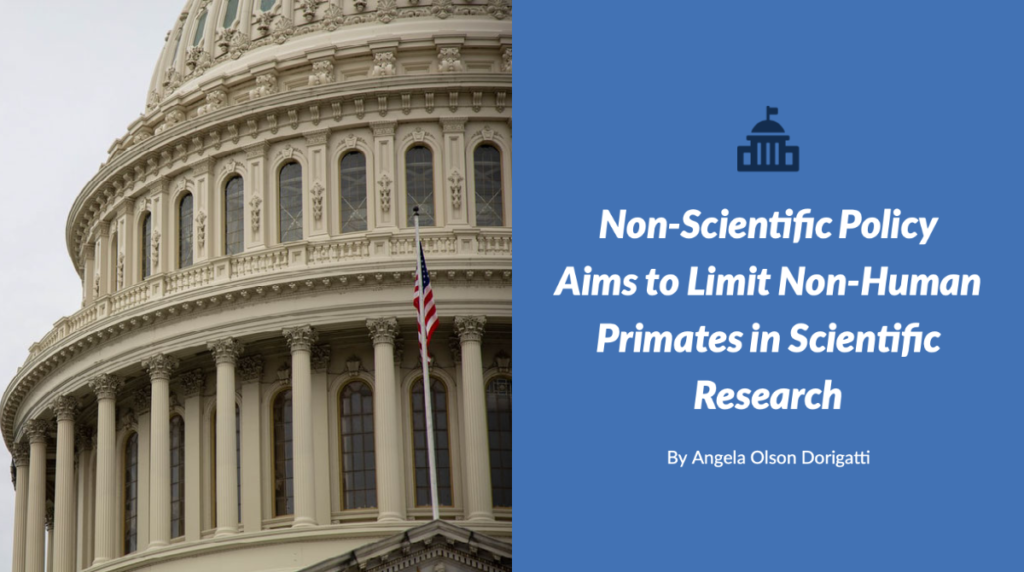Non-Scientific Policy Aims to Limit Non-Human Primates in Scientific Research

The use of non-human primates (NPH) for research has been a hot-topic button for several years. While the use of primates in research in the United States is tightly regulated and highly scrutinized by the Institutional Animal Care and Use Committee (IACUC) to ensure that the research is done in accordance to the Animal Welfare Act, there has been of push-back from non-scientific animal advocacy groups. These groups have lobbied heavily for their end-goal to eliminate all primate research, resulting in alterations of the law that unnecessarily restrict critical research further and further. As the scale tips toward their favor, scientific advocacy groups are stepping up with education, compassion, and law.
The American Society for Pharmacology and Experimental Therapeutics (ASPET) is one such organization. One of their highlighted goals is to, “identify, develop and advocate for actionable science polices that are crucial to (their) membership.” This includes recruiting a new generation of science policy advocates to become an active voice for the scientific community. As 2020 ASPET Washington Fellow, I traveled to congress and met with policy-makers to discuss how the 2020 appropriations bill and reports undermine the progress being made in NHP research. As a result of this experience, I wrote an article for the September 2020 issue of The Pharmacologist as a call-to-action to advocate for primate research during the COVID-19 pandemic (you can access the article here, pp150-151).
Restrictions in the 2020 appropriations bill pressures researchers at the National Institutes of Health (NIH), The Food and Drug Administration (FDA) and the Department of Veterans Affairs (VA) to limit, reduce, or eliminate their use of NHPs in scientific research. This will directly impede scientific progress, innovation, and discovery and cause unwarranted delays of preclinical testing of life-saving drugs and devices. While monkeys only account for less than one-half of one percent of all research, they are integral in advancing scientific discovery. The use of NHPs in biomedical research are highly valued due to their genetic similarity to humans which is fundamental in finding cures for dozens of human diseases (including neurodegenerative diseases, cancer, and diabetes).
Now, more than ever, scientific research must be guided by reason, logic, and common sense. These detrimental restrictions set a dangerous precedent for non-scientific constraints on research in other areas of science that are vulnerable to political debate. ASPET and other scientific advocacy organization are working steadfast to ensure that non-scientific policies do not obstruct reasonable and ethical scientific research.
ASPET Washington Fellows program application opens on Tuesday, October 13, 2020, and is open to any graduate student, postdoctoral trainee, or researcher no more than four years past the completion of his/her postdoctoral training. If you are interested in science and public policy, please visit www.ASPET.org for more information.
About The Author
 Angela Olson Dorigatti is a graduate student in Dr. Veronica Galvan’s lab where she is working on research related to Alzheimer’s Disease at Sam and Ann Barshop Institute for Longevity and Aging Studies. As an aging researcher, she is interested to test whether some of these aging interventions could slow or halt the progression of Alzheimer’s Disease. In her research, she has found that tau can enter astrocytes (specialized glial cells that are important in neuronal homeostasis) which then induces senescence, causing cells to stop dividing and release pro-inflammatory proteins. This pro-inflammatory environment, in turn, damages neurons and leads to neurodegeneration in Alzheimer’s Disease. The “Beyond The Bench” series features articles written by students and postdoctoral fellows at The University of Texas Health Science Center San Antonio.
Angela Olson Dorigatti is a graduate student in Dr. Veronica Galvan’s lab where she is working on research related to Alzheimer’s Disease at Sam and Ann Barshop Institute for Longevity and Aging Studies. As an aging researcher, she is interested to test whether some of these aging interventions could slow or halt the progression of Alzheimer’s Disease. In her research, she has found that tau can enter astrocytes (specialized glial cells that are important in neuronal homeostasis) which then induces senescence, causing cells to stop dividing and release pro-inflammatory proteins. This pro-inflammatory environment, in turn, damages neurons and leads to neurodegeneration in Alzheimer’s Disease. The “Beyond The Bench” series features articles written by students and postdoctoral fellows at The University of Texas Health Science Center San Antonio.
